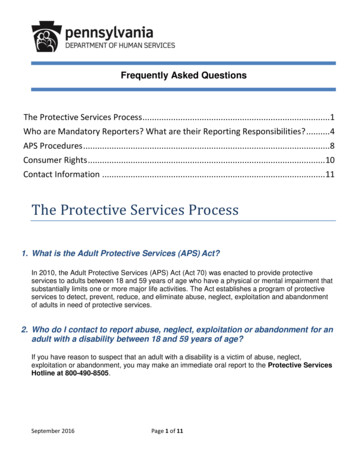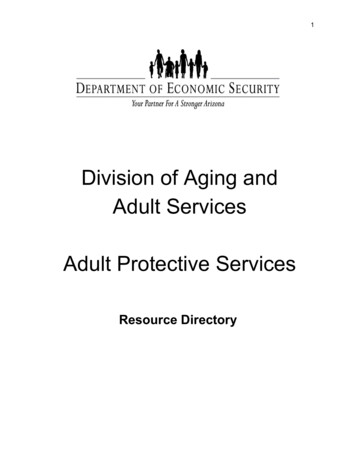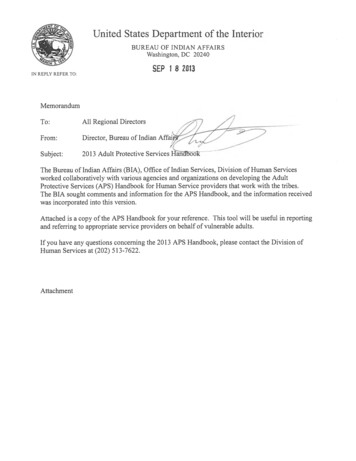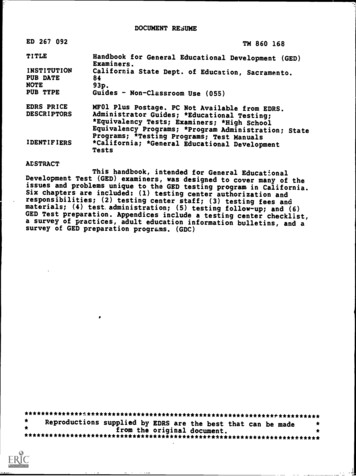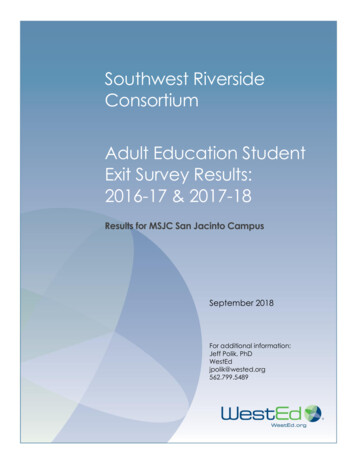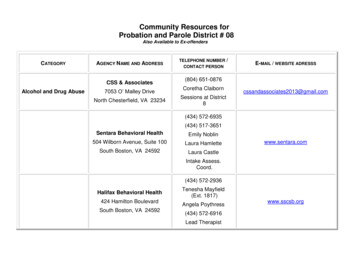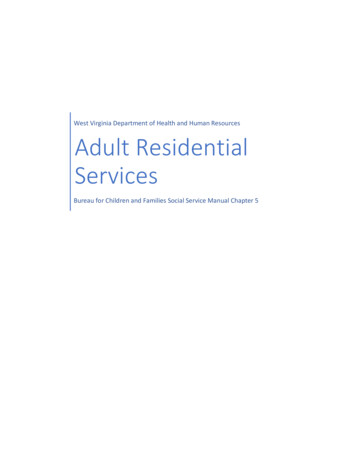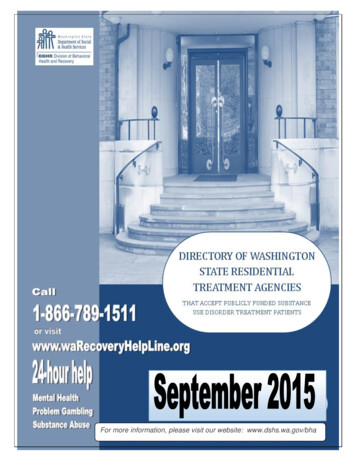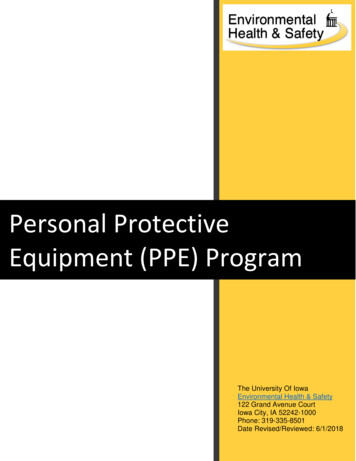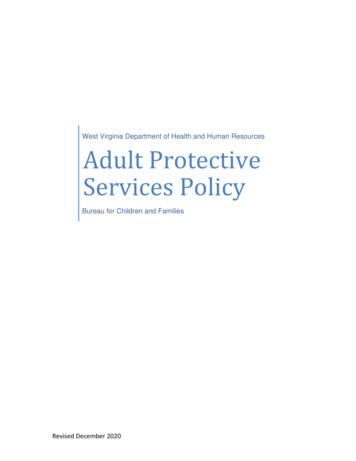
Transcription
West Virginia Department of Health and Human ResourcesAdult ProtectiveServices PolicyBureau for Children and FamiliesRevised December 2020
WV APS PolicyContentsSection 1 Introduction and Overview . 41.1 Introduction .41.2 Philosophical Principles .4Client’s Consent . 4Cultural Awareness . 41.3 Mission & Purpose .51.4 Statutory Basis .61.5 Definitions .6Section 2 Intake . 102.1 Introduction .102.2 Statutory Requirements.11Reporting Allegations. 11Abrogation of Privileged Communications . 11Mandatory Reporting . 11Reporting Suspected Animal Cruelty . 12Follow-Up Reporting to the Medical Examiner . 12Immunity from Liability. 13Cooperation Among Agencies . 13Confidentiality . 13Access by APS to Protected Health Information of Alleged Victims . 14Conflict of Interest . 142.3 Information Gathering .142.4 Eligibility Criteria.15Intake and Investigation Eligibility . 152.5 Referral Disposition and Response Times .16Response Times . 17Considerations in Determining Response Time . 18After Determination of Response Time . 18Recurrent Referrals . 192.6 Referrals Involving Specific Situations .19Referrals Involving Violent Crimes . 20Referrals Involving an Active Mental Health Client . 20Referrals Involving Financial Exploitation . 20Referrals Involving Nursing Home, Assisted Living, Group Home, and ResidentialSettings. 21Referrals Involving State Operated Mental Health and Long-Term Care Facilities . 22Referrals Involving a Service Agency . 23Referrals Involving Acute Primary Care Hospital . 23Referrals Involving Law Enforcement or Correctional Facility . 23Referrals Involving Adult Family Care Recipients . 24Revised December 20201
WV APS PolicyReferrals Involving Suspected Methamphetamine Laboratories and/or Use . 24Section 3 Investigation and Risk Assessment . 243.1 Introduction .243.2 Timeframes.25Completion of Investigation and Risk Assessment . 253.3 Worker Safety .253.4 Procedure and Responsibilities During an Investigation .273.5 Information Gathering .30Demographic Information . 31Living Arrangements . 32Client Functioning . 32Physical/ Medical Health . 32Mental/ Emotional Health . 33Financial Information . 33Education/ Vocational Information . 33Employment Information . 34Military Information. 34Legal Information . 34Decision Making Capacity . 34Assessment of Risk . 353.6 Corrective Action Plan .353.7 Short-Term Service Planning .373.8 Conclusion of Investigation and Risk Assessment .383.9 Disposition of Investigation .393.10 Penalties for Caregivers .393.11 Required Notifications .39Section 4 Case Management . 424.1 Introduction .424.2 Comprehensive Assessment .42Time Frames . 43Conclusion of Comprehensive Assessment . 434.3 Service Plan .43Inclusion of the Incapacitated Adult in Service Planning . 44Determining the Least Intrusive Level of Intervention . 44Required Elements . 45Developing a Plan to Assure Safety . 45Out-of-Home Placement Considerations. 464.4 Administrative Processes .464.5 Exceptions to Policy .464.6 Payments by DHHR .47Revised December 20202
WV APS PolicyCourt Ordered Payments - General . 47Court Ordered Payments – Required Procedures . 47Emergency Hospital/ Nursing Home Placement . 48Special Medical Authorization . 50Other Payments . 524.7 Transfer of Cases between Counties .52Timing of Transfers . 53Sending County Responsibilities . 53Receiving County Responsibilities . 534.8 Case Review .54Timeframes . 54Extensions . 54Conducting the Review . 55Documentation of Review . 55Section 5 Case Closure . 555.1 Introduction .555.2 Purpose .555.3 Purging of APS Records .56Section 6 Nondiscrimination, Grievance Procedure & Due ProcessStandards, Reasonable Modification Policies, and confidentiality . 566.1 Nondiscrimination .566.2 Non-Discriminatory Placement Protocol .576.3 Complaint Procedure and Due Process Standards .58A: Complaints Based on Disability or other Forms of Discrimination . 58Procedure . 58B: Grievances Regarding the Adult Services Worker or Casework Process. 606.4 Reasonable Modification Policy .60A: Purpose . 60B: Policy . 616.5 Limited English Proficiency .63PROCEDURES: . 63Appendix A WVDHHR Civil Rights Discrimination Complaint Form 66APPENDIX B Protocol for Methamphetamine Investigations . 69APPENDIX C Financial Services Modernization Act . 78APPENDIX D Signs of Financial Exploitation . 79APPENDIX E Rights During an APS Process . 80Client’s Rights During an APS Process .80Alleged Perpetrator’s Rights During an APS Process .81APPENDIX F Notification Letter . 82Revised December 20203
WV APS PolicySection 1 Introduction and Overview1.1 IntroductionAdult Protective Services (APS) policy sets forth the philosophical, legal, practice, andprocedural issues which currently apply to Adult Services in West Virginia. This material isbased upon a combination of requirements from various sources including but not limited to:social work standards of practice, accepted theories and principles of practice relating toservices for vulnerable adults, chapter 9 of the West Virginia Code, and case decisions madeby the Supreme Court of Appeals of West Virginia.1.2 Philosophical PrinciplesAPS workers uphold the right to self-determination of all clients. It is of the utmostimportance to enhance capacity and allow vulnerable adults to address their own needs.When working with vulnerable adults, APS workers shall ensure that the adult’s rights, asguaranteed under the Fourteenth Amendment of the United States Constitution, and theWest Virginia Constitution, are not infringed upon unnecessarily.Client’s ConsentAPS investigations are not voluntary; however, the client’s consent must be obtainedbefore case management services are provided, unless the consent cannot be obtained;such as when the client is in an emergency situation and appears to meet the definition of avulnerable adult: is unwilling to remove themselves from danger; or is unwilling to be removed by others.If the APS worker is unable to reduce the resistance in any of these situations, it may benecessary to pursue legal action in order to provide needed intervention.Because of these varied and complex considerations, it is vital that the DHHR be able toproceed in a timely manner but also with sensitivity, understanding, and knowledge whenintervening with adults. Whenever the DHHR becomes involved, the intervention providedmust be the least restrictive alternative and be appropriate to meet the needs of theindividual while assuring the highest degree of autonomy and self-determination possible.Meeting all these requirements frequently calls for maintaining a delicate and skillful balanceby the APS worker.Cultural AwarenessEffective intervention requires that APS respond in a non-punitive noncritical manner andoffer help in the least intrusive way possible. Adults shall be treated with dignity and respectby staff and all providers of service working with them. It is the worker’s responsibility toensure the rights of adults and families being served are protected. In doing so, APS workersshall not assume all adults are heterosexual, cis-gender or gender-conforming and will treatLesbian, Gay, Bisexual, Transgender, Questioning, and Intersex (LGBTQI) adults with respectRevised December 20204
WV APS Policyand competence. Workers will also adhere to all state and federal laws related to protectedclasses.Cultural awareness is ensured by recognizing, respecting, and responding to the culturallydefined needs of individuals that we serve.All professionals in state and local welfare systems have an obligation to understand andadhere to the federal laws that protect adults in the communities they serve. Decisions madeby APS workers should be made without intentional or unintentional discrimination. Thisincludes not discriminating on the basis of age, race, color, sex, mental or physical disability,religious creed, national origin, sexual orientation, political beliefs and limited proficiency inspeaking, reading, writing or understanding the English language. Additionally, whennecessary, adults and families will have the right to auxiliary aids and limited languageinterpretation to ensure effective communication for individuals with hearing, vision, orspeech impairments at no additional costs. This would include but not be limited to: Services and devices such as qualified interpreters, assistive listening devices, notetakers, and written materials for individuals with hearing impairments; Qualified readers, taped texts, and Brailed or large print materials for individuals withvision impairments; and, Access to language and interpretation services.For more information on obtaining auxiliary aids, contact:Center for Excellence in Disabilities (CED)959 Hartman Run RoadMorgantown, WV 26505Phone: 304-293-4692.Toll Free: (888) 829-9426TTY: (800) 518- 1448For Language translation and interpretation services Adult Services may Contact:911 Interpreters Inc.1-855-670-2500BCF Code: 25646The APS worker will obtain a signed statement from the interpreter stating all information isconfidential and must not be shared with anyone.1.3 Mission & PurposeThe primary purpose of Adult Protective Services is to investigate reports of adult abuse,neglect, and financial exploitation while providing least restrictive interventions. It is themission of APS to provide support and services to vulnerable adults in order to improve thesafety, well-being, and independence of victims of abuse, neglect, self-neglect, and financialexploitation.Revised December 20205
WV APS Policy1.4 Statutory BasisAdult Protective Services is governed by W. Va. Code §9-6-1 et seq. Excerpts from Chapter 9regarding these obligations are included within this policy; however, reference should bemade to the entire chapter and to the following chapters: Chapter 16- Public Health Chapter 27- Mentally Ill Persons Chapter 32- Uniform Securities Act Chapter 39B-Uniform Power of Attorney Act Chapter 44A – West Virginia Guardianship and Conservatorship Act Chapter 48- Domestic Relations Chapter 55- Actions, Suits, and Arbitrations Chapter 61- Crimes and Their Punishments1.5 DefinitionsThis section contains a number of terms which are used frequently in APS. The terms anddefinitions are taken from state statute or have been adopted by the Department as a partof the APS program.W. Va. CodeAbuse: The infliction or threat of physical or psychological harm, including the use§9-6-1of undue influence or the imprisonment of any vulnerable adult or facility resident.Adult Protective Services: Services provided to vulnerable adults and may include,but are not limited to, services such as:a. Receiving reports of adult abuse, neglect, or exploitation;b. Investigating the reports of abuse, neglect, or exploitation;c. Case planning, monitoring, evaluation, and other case work and services;and,d. Providing, arranging for, or facilitating the provision of medical, socialservice, economic, legal, housing, law enforcement, or other protective,emergency, or support services.W. Va. Code§9-6-1Adult Protective Services Agency: Any public or nonprofit private agency,corporation, board or organization furnishing protective services to adults.W. Va. Code§9-6-1Basic Needs: The essential requirements necessary to sustain life, health and wellbeing such as food, clothing, shelter, and necessary medical care.Caregiver: An individual who is responsible for the care of a vulnerable adult or afacility resident, either voluntarily, by contract, by receipt of payment for care, oras a result of the operation of law, and means a family member or other individualwho provides (on behalf of such individual or of a public or private agency,organization, or institution) compensated or uncompensated care to an adult withdisabilities or a facility resident who needs supportive services in any setting.Revised December 2020W. Va. Code§9-6-16
WV APS PolicyCentralized Intake (CI): The Centralized Intake Unit is a specialized unit of workersand supervisors who are responsible for receiving and screening abuse, neglect, andfinancial exploitation referrals, requests to receive services, and contacting afterhours workers when necessary, as well as other duties. The Centralized Intake Unitoperates 24 hours a day, 7 days a week.Comprehensive Child Welfare Information System (CCWIS): The automated clientinformation system used by West Virginia Department of Health and HumanResources Bureau for Children and Families.Diminished Capacity: The inability to address, avoid, prevent or stop financial W. Va. Supremeexploitation because of physical, mental or emotional conditionsCourt Rules ofPractice andProcedure forFinancialExploitationCivilProceedingsDomestic Violence: The occurrence of one or more of the following acts betweenW. Va. Codefamily or household members: (1) attempting to cause or intentionally, knowingly§48-27-202or recklessly causing physical harm to another with or without dangerous or deadlyweapons; (2) placing another in reasonable apprehension of physical harm; (3)creating fear of physical harm by harassment, psychological abuse or threateningacts; (4) committing either sexual assault or sexual abuse as those terms are definedin W.Va. Code §§61-8b-1, et seq. and 61-8d-1, et seq.; and (5) holding, confining,detaining or abducting another person against that person’s will.Elder: A person aged 65 years or older.Emancipated Minor: A child over the age of sixteen (16) who has been emancipatedby 1) order of the court, pursuant to a proceeding outlined in W. Va. Code §49-4115(a) based on a determination that the child can provide for his or her physicaland financial well-being and has the ability to make decisions for himself or herself;or 2) marriage of the child. An emancipated minor has all the privileges, rights andduties of an adult including the right to contract, except that the child remains achild as defined for the purposes of W. Va. Code §49-2-1001 et seq. and §49-4-701et seq.W. Va. Code§61-2-29W. Va. Code§49-4-115Emergency or Emergency Situation: A situation or set of circumstances whichpresents a substantial and immediate risk of death or serious injury to a vulnerableadult.Revised December 20207
WV APS PolicyFacility or Nursing Home: Any institution, residence, intermediate care facility forindividuals with an intellectual disability, care home or any other adult residentialfacility, or any part or unit thereof, that is subject to the provisions of W. Va. Code§16-5C-1 et seq., §16-5D-1 et seq., §16-5E-1 et seq., or §16-5H-1 et seq.W. Va. Code§9-6-1Facility Resident: An individual living in a nursing home or other facility, as that termis defined in subdivision (9) of this section.W.Va. Code§9-6-1Family or Household Member: Current or former spouses, persons living asspouses, persons who formerly resided as spouses, parents, children andstepchildren, current or former sexual or intimate partners, are or were dating,other persons related by blood or marriage, persons who are presently or in thepast have resided or cohabitated together or a person with whom the victim has achild in common.W. Va. Code§48-27-204Fiduciary: A person or entity with the legal responsibility to make decisions onbehalf of and for the benefit of another person; to act in good faith and withfairness; and includes a trustee, a guardian, a conservator, an executor, or an agentunder a financial power of attorneyW. Va. Code§9-6-1Financial Exploitation: The intentional misappropriation, misuse, or use of undueinfluence to cause the misuse of funds or assets of a vulnerable adult or facilityresident, but does not apply to a transaction or disposition of funds or assets wherea person made a good faith effort to assist the vulnerable adult or facility residentwith the management of his or her money or other things of value;W. Va. Code§9-6-1Imminent Danger: Circumstances exist which indicate the immediate threat ofdeath or serious physical injury.Incapacity: The inability because of physical or mental impairment to appreciatethe nature and implications of a health care decision, to make an informed choiceregarding the alternatives presented, and to communicate that choice in anunambiguous manner.W. Va. Code§16-30-3Legal Representative: A person lawfully invested with the power and charged withthe duty of taking care of another person or with managing the property and rightsof another person, including, but not limited to, a guardian, conservator, medicalpower of attorney, trustee or other duly appointed person.W. Va. Code§9-6-1Neglect: The unreasonable failure by a caregiver to provide the care necessary tomaintain the safety or health of a vulnerable adult or self-neglect by a vulnerableadult, including the use of undue influence by a caregiver to cause self-neglectW. Va. Code§9-6-1Revised December 20208
WV APS PolicyPreventative Adult Protective Services (PAPS): A range of supportive servicesprovided to vulnerable adults or facility residents where the threat of harm exists,and without intervention, it is likely that abuse, neglect, or financial exploitationwill result.Regional Long-Term Care Ombudsman: Any paid staff of a designated regionallong-term care ombudsman program who has obtained appropriate certificationfrom the Bureau for Senior Services and meets the qualifications set forth in W. Va.Code §16-5L-7.W. Va. Code§9-6-1Self-Neglect: The inability of a vulnerable adult to meet his or her own basic needsof daily living due to mental or physical condition.Sexual Abuse: The coercion of a vulnerable adult or facility resident into havingsexual contact with the perpetrator or another person. The perpetrator may beinvolved either directly (e.g. the sexual partner) or indirectly by allowing or enablingthe conditions which result in the sexual coercion.Social Isolation: Controlling, denying, limiting, or coercing visits or conversations,or both, with friends, family, and acquaintances; outside involvement; reading;spiritual beliefs, traditions and events; and access to others. Examples arecontrolling, denying, limiting or coercing transportation, phone use, electronic orassistive communication devices; using verbal abuse and threats to keep othersaway: severing social relationships through manipulative tactics; and limiting accessto friends or family through frequent moves or remote housing, or both.State Long-Term Care Ombudsman: An individual who meets the qualifications ofWest Virginia Code §16-5L-5 and who is employed by the State Bureau for SeniorServices to implement the State Long-term Care Ombudsman Program.W. Va. Code§9-6-1Subpoena: The process by which a court commands a witness to appear and givetestimony.Subpoena Duces Tecum: A subpoena that commands the production of specifiedevidence in a person's possession.Substantiation: A determination that a vulnerable adult or facility resident meetsall of the Adult Protective Services eligibility criteria. The investigation anddocumentation of a situation in which a vulnerable adult has been abused,neglected or financial exploited, or the investigation and documentation of asituation in which a vulnerable adult is at threat of harm from abuse, neglect, orfinancial exploitation.Revised December 20209
WV APS PolicyThreat of Harm: All activities, conditions, and circumstances that are likely to placethe vulnerable adult or facility resident at threat of severe harm of abuse, neglect,or financial exploitation.Undue Influence: Excessive persuasion that causes another person to act or refrainfrom acting by overcoming that person’s free will and results in inequity.W. Va. SupremeCourtRules ofPractice andProcedure forFinancialExploitationCivilProceedingsVerbal Abuse: The threat to inflict physical pain or injury on or the imprisonmentof any vulnerable adult or facility resident. The threat to inflict physical pain orinjury includes, but is not limited to, threatening to withhold food, hydration and/ormedical treatment. The threat to imprison includes, but is not limited to, isolation.The verbal threat(s) must be perceived by the client or others to be real. Nonmalicious teasing does not constitute verbal abuse.Verification of Allegations: A determination made that addresses the allegationsreported and indicates if the alleged incident occurred or not. The allegation maybe verified that it occurred but may or may not meet the definition of neglect, abuseor financial exploitation in order to substantiate.Vulnerable Adult: Any person over the age of 18, or an emancipated minor, who by W. Va. Code §9reason of physical or mental condition is unable to independently carry on the daily6-1activities of life necessary to sustaining life and reasonable health and protectionSection 2 Intake2.1 IntroductionW. Va. Code §9-6-11 sets forth the details regarding reporting of abuse, neglect, financialexploitation, or emergency situations involving a vulnerable adult or facility resident. Anyindividual may report known or suspected cases of abuse, neglect, financial exploitation, oremergency situations involving a vulnerable adult or resident of a nursing home or residentialfacility. These reports shall be made directly to DHHR’s Centralized Intake. Reports shall bereceived 24 hours a day, 7 days a week. In addition, if the vulnerable adult or facility residentis willing and able, they may make a report on their own behalf.R
The APS worker will obtain a signed statement from the interpreter stating all information is confidential and must not be shared with anyone. 1.3 Mission & Purpose The primary purpose of Adult Protective Services is to investigate reports of adult abuse, neglect, and financial exploitation while providing least restrictive interventions. It is the
